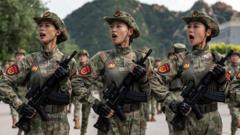Is China’s Grand Military Parade a Show of Power or Paranoia?

Published: 2025-09-02 06:45:25 | Category: world
This article explores the grand military parade in Beijing, orchestrated by President Xi Jinping, celebrating 80 years since Japan's surrender in World War II. The event, featuring notable foreign leaders, represents not only a display of military power but also a means for Xi to bolster national pride amid domestic challenges.
Last updated: 13 October 2023 (BST)
Key Takeaways
- The parade marks 80 years since Japan's surrender in World War II.
- Foreign leaders in attendance include Vladimir Putin and Kim Jong Un.
- It serves as a display of China's military strength and Xi's global influence.
- The event reflects China's internal struggles and need for patriotic sentiment.
- Heightened security measures have been implemented to control public sentiment.
Setting the Scene in Beijing
In the heart of Beijing, Tiananmen Square transforms into a stage for a spectacular display of military might. This event is not merely a commemoration; it serves as a powerful reminder of China's growing stature on the world stage and the leadership of President Xi Jinping.
A Grand Display of Power
The parade features eight massive Chinese flags that flutter alongside the iconic portrait of Mao Zedong, the founder of Communist China. The backdrop of the Gate of Heavenly Peace, overlooking one of the largest public squares globally, sets a historic stage for this military showcase. Rows of seats are reserved for 26 foreign heads of state, with notable attendees including Russia's Vladimir Putin and North Korea's Kim Jong Un, signalling a diplomatic win for Xi.
The Significance of the Parade
This year’s parade marks the 80th anniversary of Japan's surrender in World War II. For Xi, however, it represents much more than a historical commemoration. It is a critical moment to assert China's military capabilities, especially as tensions with the United States continue to rise. The presence of influential leaders from Iran, Malaysia, and other nations further emphasises Xi's ambitions of positioning China as a central player in global affairs.
Rebooting Diplomatic Relations
In a notable move, Indian Prime Minister Narendra Modi visited China for the first time in seven years, highlighting a renewed focus on economic and strategic partnerships. The recent Shanghai Cooperation Organisation (SCO) summit, which saw the attendance of over 20 world leaders, has further solidified Xi’s role as a global leader.
Domestic Implications of the Parade
While the parade serves as a show of strength on the international stage, it also reflects internal dynamics within China. As the country grapples with economic challenges, including high youth unemployment and declining property prices, the parade embodies a call for national pride and unity.
The Historical Narrative
China's portrayal of World War II as a "people's war of resistance against Japanese aggression" often overlooks the role of the nationalists who initially led the resistance. This historical narrative has been reinforced through a series of state-sponsored films and media campaigns aimed at fostering a sense of patriotism. This effort comes amidst rising tensions with Japan, as evidenced by China's protest against Japan's attempts to dissuade other nations from attending the parade.
Security Preparations and Public Reaction
The lead-up to the parade has been marked by heightened security measures. Reports indicate that the Chinese government has implemented strict controls in Beijing, including bans on drones and increased surveillance. The atmosphere in the city has shifted, with residents feeling the impact of the parade preparations.
Public Discontent and Control
Despite the government's efforts to project a sense of unity and strength, there are signs of discontent among the population. Young people, in particular, have expressed frustration over economic stagnation and a lack of opportunities. The Party's control over public discourse is evident, with significant efforts to prevent any dissenting voices from emerging during this sensitive period.
The Spectacle of Military Might
As the parade approaches, the sounds of military rehearsals echo throughout the city. Tanks and troops have been practising their formations, creating an atmosphere of anticipation and unease. Residents living near Chang'an Avenue have been advised to remain indoors during these rehearsals to maintain secrecy.
Disruption and Daily Life
The parade has significantly disrupted daily life in Beijing. Schools, businesses, and hotels along the parade route have closed, and public transport has been affected due to road diversions and subway line closures. The usual convenience of shared bikes has also been impacted, as city workers have moved them away from the parade areas.
Weather Control and the Parade
In past years, China has reportedly used cloud-seeding techniques to ensure clear skies for major events. While it remains uncertain if this tactic has been employed this year, forecasts indicate favourable weather conditions for the parade. Authorities appear determined to ensure that President Xi's display of military might is executed flawlessly.
What Lies Ahead
The upcoming parade is more than just a national celebration; it is a pivotal moment for Xi Jinping and the Communist Party. With the eyes of the world upon them, the implications of this event will resonate far beyond Beijing. As China seeks to assert its influence, what will be the long-term effects on both domestic and international fronts?
FAQs
What is the significance of the military parade in Beijing?
The military parade in Beijing commemorates the 80th anniversary of Japan's surrender in World War II, showcasing China's military power and asserting Xi Jinping's leadership on the global stage.
Who are the notable foreign leaders attending the parade?
Notable foreign leaders attending the parade include Vladimir Putin from Russia and Kim Jong Un from North Korea, marking significant diplomatic engagements for China.
How has the parade impacted daily life in Beijing?
The parade has caused significant disruptions in daily life in Beijing, including the closure of schools, businesses, and public transport, alongside heightened security measures in the city.
What measures has China taken to control public sentiment during the parade?
China has implemented strict security measures, including bans on drones and increased surveillance, along with efforts to suppress dissenting voices as the parade approaches.
Are there any economic implications associated with the parade?
The parade is seen as a means to rally national pride amidst economic challenges, including high youth unemployment and declining property values, reflecting the government's attempt to unite the public.



